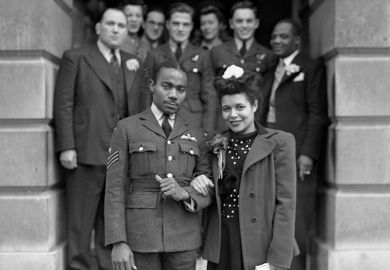In her diary from Bergen-Belsen, Hanna Lévy-Hass, a young Jewish communist from Yugoslavia, describes a shocking scene of a boy whose body has been infested by fleas. He “couldn’t kill the vermin that had settled on his body because he couldn’t see them; they’ve burrowed deep into his skin and swarmed through his eyebrows. His chest is completely blackened by these fleas and their nests. We have never seen such a thing; we never imagined such a thing could occur…Everyone avoids him. His brothers and sister dread his presence, his fleas, his howling.” This is just one of many painful examples with which Amos Goldberg grapples in this brilliant book, which overturns the ways in which we think about the experiences of the Holocaust’s victims.
Historians have increasingly turned to diaries as a way of countering the depiction of Jews found in Nazi documents. Goldberg seeks to go beyond the use of the “voices of the victims” to show that fashionable assumptions about the “survival of the human spirit”, to which we turn all too easily in commemorative ceremonies, have misunderstood what really happened. There is not the space here to do justice to Goldberg’s superb and genuinely interdisciplinary readings, which bring autobiography, psychoanalysis and history together in ways that explode what is normally understood by Holocaust victims’ “life stories”. But in general, what he shows – first through a wide survey of diaries and theoretical discussion of the “life story” approach, and then by close readings of the diaries of Victor Klemperer (Dresden) and Chaim Kaplan (Warsaw Ghetto) – is that the narratives written during the Holocaust were unable to deliver their authors from their distress. His key insight is that, during the Holocaust, the victims’ “self” was annihilated and the diary was unable to restore it. The function of Holocaust diaries differs from the usual role played by “life stories”: they do not provide a therapeutic alternative to an attack on the self; rather, they confirm that the self has been destroyed. What we see in these diaries, Goldberg writes, is “a consciousness that observes the process of its own disintegration”, and thus the life story “becomes the death story of the protagonist who is, biologically, still alive”.
This is hard reading – it overturns our desire to see the Holocaust diary as a kind of spiritual resistance, or as proof that the spirit survives even in the most oppressive of circumstances. The only comparisons I can think of – which prove Goldberg’s point – are the honest and brutal stories of Isaiah Spiegel (Ghetto Kingdom), which show how the ghetto destroyed not just social life and familial relations but the individual’s sense of self, leaving them biologically alive but with no cultural characteristics that make human organisms into human beings.
This is a book that deserves to be read well beyond Holocaust studies. Goldberg’s theoretical insights into “life stories” and his readings of law, language and what he calls the “epistemological grey zone” – when diarists take on some of their persecutors’ ways of thinking – provide a stunning antidote to our unthinking treatment of survivors as celebrities (as opposed to just people who have suffered terrible things) and to the ubiquity of commemorative platitudes.
Dan Stone is professor of modern history at Royal Holloway, University of London.
Trauma in First Person: Diary Writing During the Holocaust
By Amos Goldberg
Indiana University Press
306pp, £54.00
ISBN 9780253029744
Published 20 November 2017
POSTSCRIPT:
Print headline: From life story to death story
Register to continue
Why register?
- Registration is free and only takes a moment
- Once registered, you can read 3 articles a month
- Sign up for our newsletter
Subscribe
Or subscribe for unlimited access to:
- Unlimited access to news, views, insights & reviews
- Digital editions
- Digital access to THE’s university and college rankings analysis
Already registered or a current subscriber?








